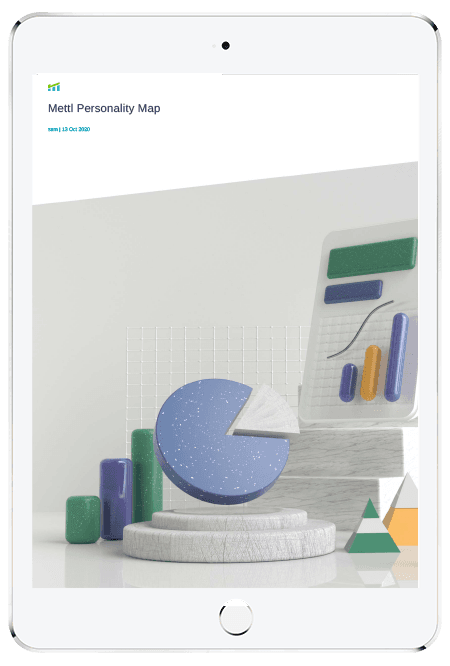High-Potential Identification Test to assess and develop employees for success
The Mercer | Mettl High-Potential Identification Assessment evaluates potential hires and employees to find and hire candidates who thrive in leadership roles and make impactful contributions to the organization's advancement and success. This High-Potential Employees Test enables organizations to find HiPo employees and drive learning, development and succession planning initiatives.
Ready to use
Psychometric, Aptitude
85 minutes
130 questions
Mid-management level roles, First-time manager roles
German, Mexico Spanish, Italian, Spanish, Mandarin, English India, Portuguese (Brasil), Indonesian, Turkish, French, English Global
About the Mercer | Mettl High-Potential Identification Assessment
The High-Potential Test helps determine an employee or prospective hire's potential. The HiPo Employee Assessment evaluates essential competencies for high-potential professionals to succeed in today's competitive business environment. This test assesses a candidate's intellect as one of its critical competencies in navigating challenges and executing optimal decisions. An employee with a forward-thinking approach, strategic planning skills, critical thinking skills, and a goal-driven mindset contributes to the organization's growth, performance, and resilience in the business landscape.
What is the importance of the High-Potential Identification Test?
Companies focus on discovering and hiring professionals with the motivation, abilities, and capacity to contribute to the organization's success. Identifying high-potential employees can be challenging as they are highly sought-after individuals with remarkable skills, leadership aptitude, and a knack for driving innovation, making them desirable to numerous organizations. Distinguishing high-potential employees requires an in-depth assessment of cognitive abilities, personality traits, and leadership potential. This test measures the competencies and attributes linked to high-potential individuals. They are structured objectively to evaluate a candidate's problem-solving skills, cognitive abilities, personality profile, and leadership aptitude. Using these scientifically validated assessment tools helps organizations uncover critical insights, including an individual's strengths, areas for development, and growth potential. Organizations can make data-driven and evidence-based hiring decisions in recruitment, ensuring that high-potential employees are given opportunities.
How can a High-Potential Identification Test help you hire?
This test analyzes a candidate's drive and determination to learn, grow and succeed. It assesses a drive to excel, learning orientation and initiative-taking ability. The drive to excel indicates a person's determination to develop, pursue excellence, and persistence toward success. Initiative-taking ability is an individual's ingenuity and resourceful attitude. Learning orientation refers to a person's adaptiveness, growth mindset and feedback responsiveness. The Mercer | Mettl High-Potential Employees Assessment also measures applicants' agility, determining their ability to work efficiently and effectively handle ambiguity. The test considers a candidate's leadership potential to deal with internal and external stakeholders to achieve organizational goals. Therefore, hiring managers and employers can utilize the Mercer | Mettl High-Potential Test to determine a candidate's job aptitude and suitability by evaluating them on the abovementioned competencies and making informed decisions.
What is inside this test?
Subject matter experts design this test. It consists of one hundred and thirty questions to be completed in eighty-five minutes.
What skills does the High-Potential Identification Test cover?
- Lead: It comprises the following competencies - propensity to lead and stakeholder management.
- Drive: It includes the following competencies - drive to excel, learning orientation, and initiative-taking.
- Intellect: It encompasses the following competencies - strategic thinking and critical decision-making.
- Agility: It includes the following competencies - navigating ambiguity and adaptability.
What roles can you assess when using the High-Potential Identification Test?
- Mid-management level roles
- First-time manager roles
SKILL LIBRARY
High-Potential Identification Test competency framework
Get a detailed look inside the test
High-Potential Identification Test competencies under scanner
HiPo Employee skills
Competencies:
It comprises the following competencies - propensity to lead and stakeholder management.
It encompasses the following competencies - strategic thinking and critical decision-making.
It includes the following competencies - drive to excel, learning orientation, and initiative-taking.
It includes the following competencies - navigating ambiguity and adaptability.
Customize this High-Potential Identification Test
Flexible customization options to suit your needs
Choose easy, medium or hard questions from our skill libraries to assess candidates of different experience levels.
Add multiple skills in a single test to create an effective assessment. Assess multiple skills together.
Add, edit or bulk upload your own coding questions, MCQ, whiteboarding questions & more.
Get a tailored assessment created with the help of our subject matter experts to ensure effective screening.
The Mercer | Mettl High-Potential Identification Assessment advantage
Frequently Asked Questions (FAQs)
How do you identify high-potential employees with a High-Potential Identification Test?
A High-Potential Test is a psychometric assessment that organizations use to identify high-potential employees by gauging personality traits, cognitive abilities, learning agility, and future potential. This standardized and objective evaluation enables organizations to spot well-suited candidates for targeted development programs and promising opportunities.
Can the assessments be aligned with an organization's competency frameworks?
Mercer | Mettl creates tailored assessments aligning with the organization's competency frameworks. We provide customized solutions by understanding specific requirements and pinpointing the key behaviours driving organizational success. Please contact Mercer | Mettl for solutions.
What implications should be considered in the variations between the assessment reports from psychometric tests and the individual's actual behaviour, aptitude, or attitude?
No psychometric assessment reports should be considered a conclusive indicator of a particular type of behaviour. It is necessary to integrate these reports with additional sources of information and view other factors that impact human behaviour. For optimal selection tools customized to your requirements, please contact Mercer | Mettl for expert guidance and assistance.


